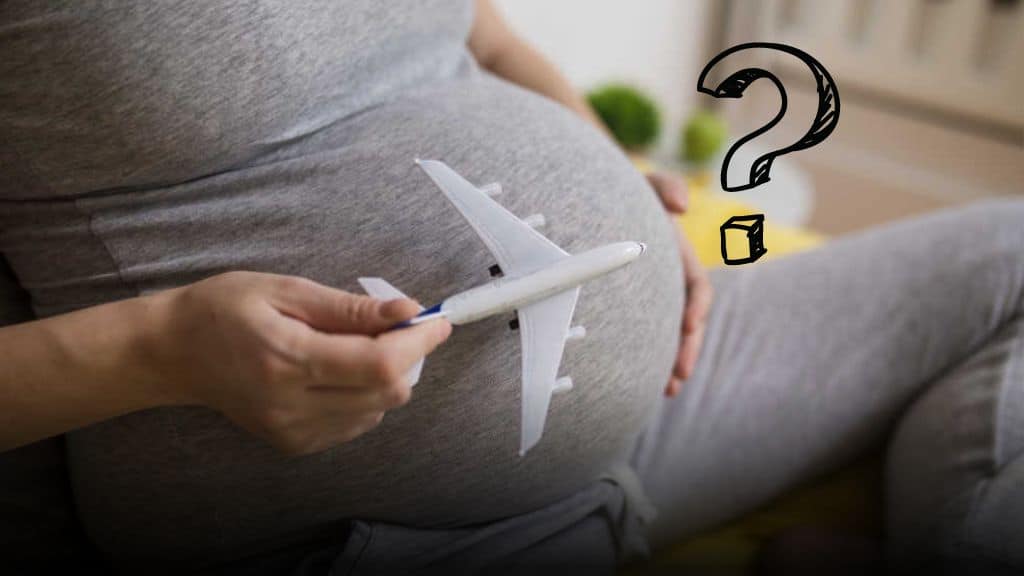
Table of Contents
Are you a traveling expectant mom? Then this article is for you because we have covered the rules and regulations of the airlines and your health. The gist is most pregnant women can travel safely throughout their pregnancy provided they take the necessary precautions, such as purchasing travel insurance.
If you require immediate medical attention, find out which healthcare facilities are located at your destination wherever that is. It’s a good idea to bring your maternity medical records, also known as handheld notes so that you can give doctors the information they need if the situation arises.
Travel Insurance
Make sure that your travel insurance covers everything that could happen, like
- Getting medical care during labor
- Having a baby too soon
- Having to change the date of your return trip if you go into labor
Why Should You Not Fly While Pregnant?
Some women prefer not to travel during the first 12 weeks of their pregnancy because they experience nausea and vomiting and feel very tired. Whether you are traveling or not, the first three months of pregnancy also carry a higher risk of miscarriage.
Traveling during a pregnant woman’s final months can be exhausting and uncomfortable because of the imminent contractions and general pain. This is why the best opportunity to travel is mid-pregnancy, somewhere in the range of 4 and a half months. Traveling during the ninth month of pregnancy is usually allowed if you have written permission from your medical health providers.
So, Can You Fly While Pregnant?
While flying is safe for both you and your unborn child, you should talk to your doctor or midwife first about any health concerns or pregnancy complications.
After 37 weeks (or 32 weeks if you are having a twin pregnancy), you naturally have a higher chance of going into labor which is why some airlines do not let you fly until the end of your pregnancy. Find out the airline’s policy on this by contacting them.
The airline may request a confirmation from your midwife or doctor about your due date and that you are not at risk of complications after 28 weeks of your pregnancy. The letter may cost you money and take several weeks to arrive.
Because the length of the flight may have an impact, tell your service provider how far you are flying.
Are There Any Risks of Traveling While Pregnant?
There is a small risk of blood clots (deep vein thrombosis, or DVT) when traveling for more than four hours. Drink plenty of water and move around frequently, about every 30 minutes, if you fly. The pharmacy has support stockings or graduated compression you can buy to help reduce swelling in your legs.
Vaccinations for Traveling While Pregnant
The majority of vaccines that use live bacteria or viruses are not recommended while pregnant due to concerns that they could harm the unborn child. However, if the risk of infection is greater than the risk of live vaccination, some live travel vaccines may be considered during pregnancy. Inquire about your physician or midwife concerning specific travel vaccinations.
Vaccines that are not live (inactivated) are safe to use during pregnancy.
Things to Remember While Traveling During Pregnancy
Keep your seatbelt fastened and secure under your belly when you are seated during the trip. Get a lot of fluids in. You might become dehydrated on the plane because of the low humidity. Before you fly, avoid foods and drinks that make you gassy. During flight, gases expand, which may make you feel uneasy. Broccoli and carbonated soda are two foods and drinks to avoid when you fly during your pregnancy.
Also, make a plan for how you will get obstetric care while you are away if you need it. If you require treatment while you are away, bring copies of your medical records.
Blood clots
Traveling by air can increase the risk of venous thrombosis, a condition in which blood clots form in the legs. The gamble is higher for pregnant individuals. Moving your legs could help you avoid this issue. During the flight, walk up and down the aisle every hour. Flex and extend your ankles from time to time if you have to remain seated. In general, avoid clothing that is too tight because this can make it harder for blood to flow. During a long flight, wearing compression stockings can improve blood circulation.
Radiation
The majority of pregnant women who travel by air at high altitudes are not thought to be at risk for radiation exposure. However, frequent flyers like flight attendants, pilots, and others might be exposed to radiation at a level that makes pregnant women nervous. Talk to your doctor about it if you have to fly a lot while you’re pregnant.
The Bottom Line?
According to the American Congress of Obstetricians and Gynecologists, if you aren’t having any issues with your pregnancy, it is generally safe to travel by air before you reach 36 weeks. Even then you must consult your doctor before traveling. If you have certain pregnancy complications that could get worse while you’re flying or necessitate immediate medical attention, your doctor might tell you not to.
A history of miscarriage or vaginal bleeding, severe anemia, and uncontrolled high blood pressure or diabetes are some medical conditions that won’t allow you to fly while pregnant. You can fly while pregnant if you do not have preeclampsia from a previous pregnancy as this can cause high blood pressure and more protein in your urine. The same holds if you are expecting twins or other multiples.
The best time to travel by air might be during the second trimester if your doctor says you can fly and your plans are flexible. During that time, the likelihood of common pregnancy emergencies is lowest.






